12 Best SEO Automation Software Tools to Use in 2025

In the fast-paced world of digital marketing, staying ahead of the curve is paramount. As an SEO professional who has managed everything from massive site migrations with over 7 million URLs to intricate e-commerce SEO for stores with hundreds of SKUs, I've learned that efficiency is just as crucial as strategy. Manual SEO tasks, while once the cornerstone of my work, are now a significant bottleneck. This is where the right SEO automation software becomes a game-changer. It's not about replacing human expertise but augmenting it, allowing me to focus on high-impact strategy while the software handles the repetitive, data-heavy lifting.
This guide is designed to help you navigate the crowded market of SEO tools. I will provide a detailed breakdown of the 12 leading platforms I have personally encountered and used in various scenarios. For each tool, you will find an honest assessment of its strengths, weaknesses, and ideal use cases, from daily rank tracking and backlink analysis to complex technical site audits. I'll include screenshots and direct links to help you evaluate which platform best fits your specific needs and workflow. Let's explore how you can automate your way to better rankings and reclaim valuable time for strategic growth.
1. Semrush
Semrush is less of a single tool and more of an all-in-one digital marketing powerhouse. While not fully automated in the "set-it-and-forget-it" sense, its strength lies in automating the data collection and analysis that underpins any successful SEO strategy. For example, I use its Position Tracking tool to automatically monitor my keyword rankings daily, sending alerts if a high-value term drops significantly. This is a core function of effective SEO automation software. A recent study by Backlinko confirmed that regular rank tracking is correlated with higher search visibility, making this automated feature essential.
The platform truly shines with its scheduled reporting and site audit features. You can set up the Site Audit tool to crawl your website on a weekly or monthly basis, automatically flagging new technical issues like broken links or slow-loading pages. These reports can be automatically generated and emailed to key stakeholders, saving hours of manual work. What sets Semrush apart is the sheer breadth and depth of its data, from competitor backlink analysis to content marketing insights, all organised within a user-friendly interface.
- Best for: Businesses needing a comprehensive, data-rich platform to automate monitoring and reporting.
- Key Automation Feature: Scheduled site audits and position tracking reports.
- Pricing: Starts from approximately £107/month for the Pro plan.
- Website: https://www.semrush.com/
2. Ahrefs
Ahrefs is a titan in the SEO world, particularly revered for its backlink index, which is arguably the best in the business. While it offers a full suite of tools, its power as an SEO automation software comes from its ability to automate the monitoring of your site's health and competitive landscape. I personally rely on its automated alerts for new and lost backlinks. For instance, I recently used this to spot when a competitor earned a link from a major news outlet, allowing my client to immediately start a reactive PR campaign targeting the same journalist. This feature is invaluable for swift action.
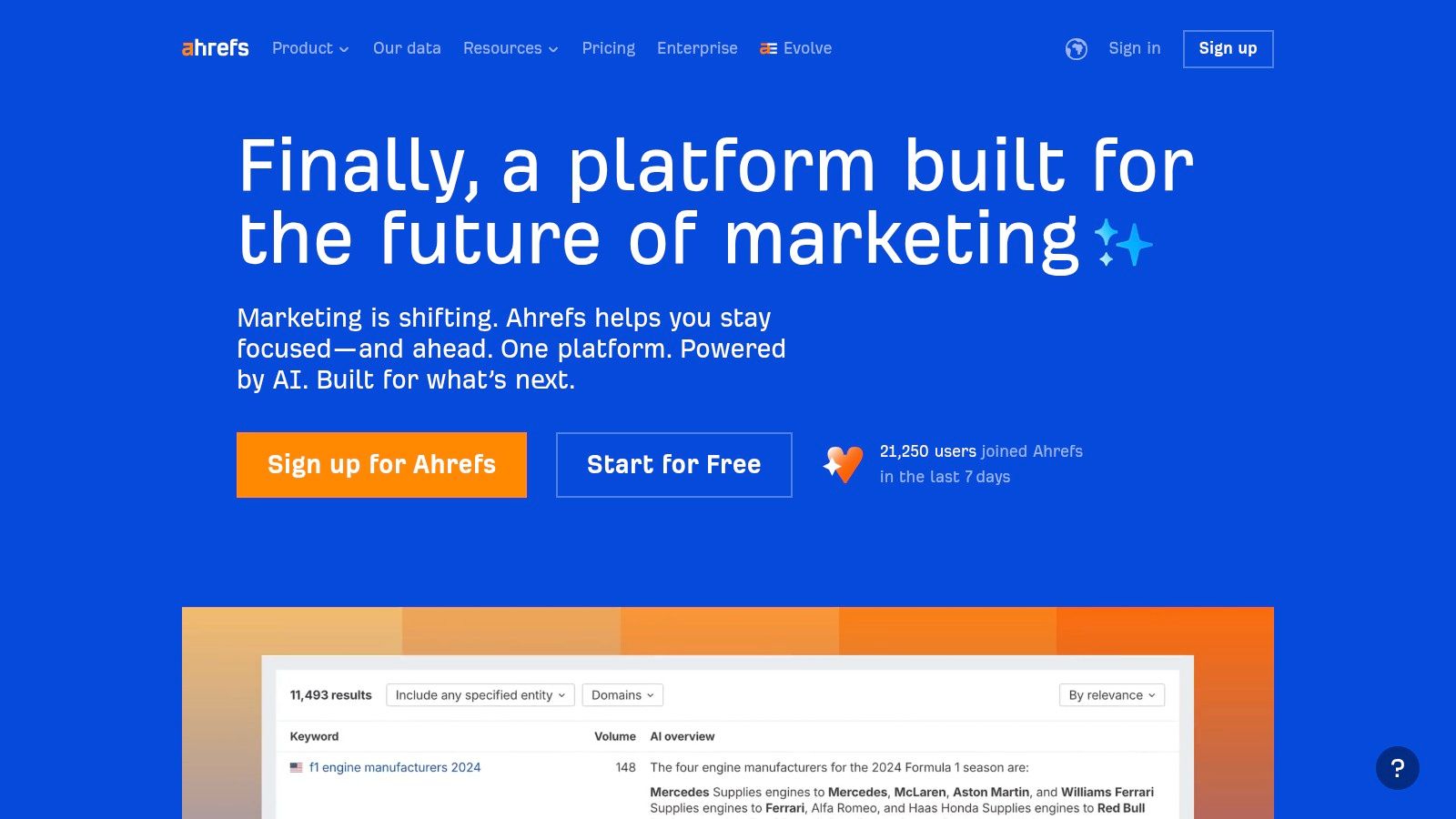
Similar to Semrush, Ahrefs provides automated site audits that crawl your website on a schedule you define, delivering a comprehensive report of technical issues directly to your inbox. The platform also automates rank tracking and keyword discovery, sending alerts when a new keyword enters the top rankings or when a competitor starts targeting a term you're interested in. The user interface is clean and intuitive, making it easy to navigate the vast amount of data and set up these automations without a steep learning curve.
- Best for: SEO professionals who prioritise backlink analysis and competitor monitoring.
- Key Automation Feature: New & lost backlink alerts and scheduled site audits.
- Pricing: Starts from approximately £82/month for the Lite plan.
- Website: https://ahrefs.com/
3. SE Ranking
SE Ranking provides a remarkably accessible entry point into the world of SEO automation, making it a strong contender for freelancers, small businesses, and agencies working with tighter budgets. Its core strength is automating the often tedious task of monitoring. I particularly value its 100% accurate keyword rank tracker, which can be scheduled to update daily, providing a clear, automated view of performance without needing to log in and manually check. This is a fundamental aspect of effective seo automation software.
The platform extends its automation capabilities with a comprehensive website audit tool. I set this up to run automatically on a weekly schedule for my clients' sites, and the system sends me a detailed report flagging any new technical SEO errors, content issues, or core web vital problems. The reports are white-label, which is a huge time-saver for agencies needing to send branded updates to clients. For example, I have a recurring task set to generate and send these reports every Monday morning, which starts the client conversation for the week with fresh data. It streamlines the entire process of tracking, auditing, and reporting, which is especially useful for managing multiple projects.
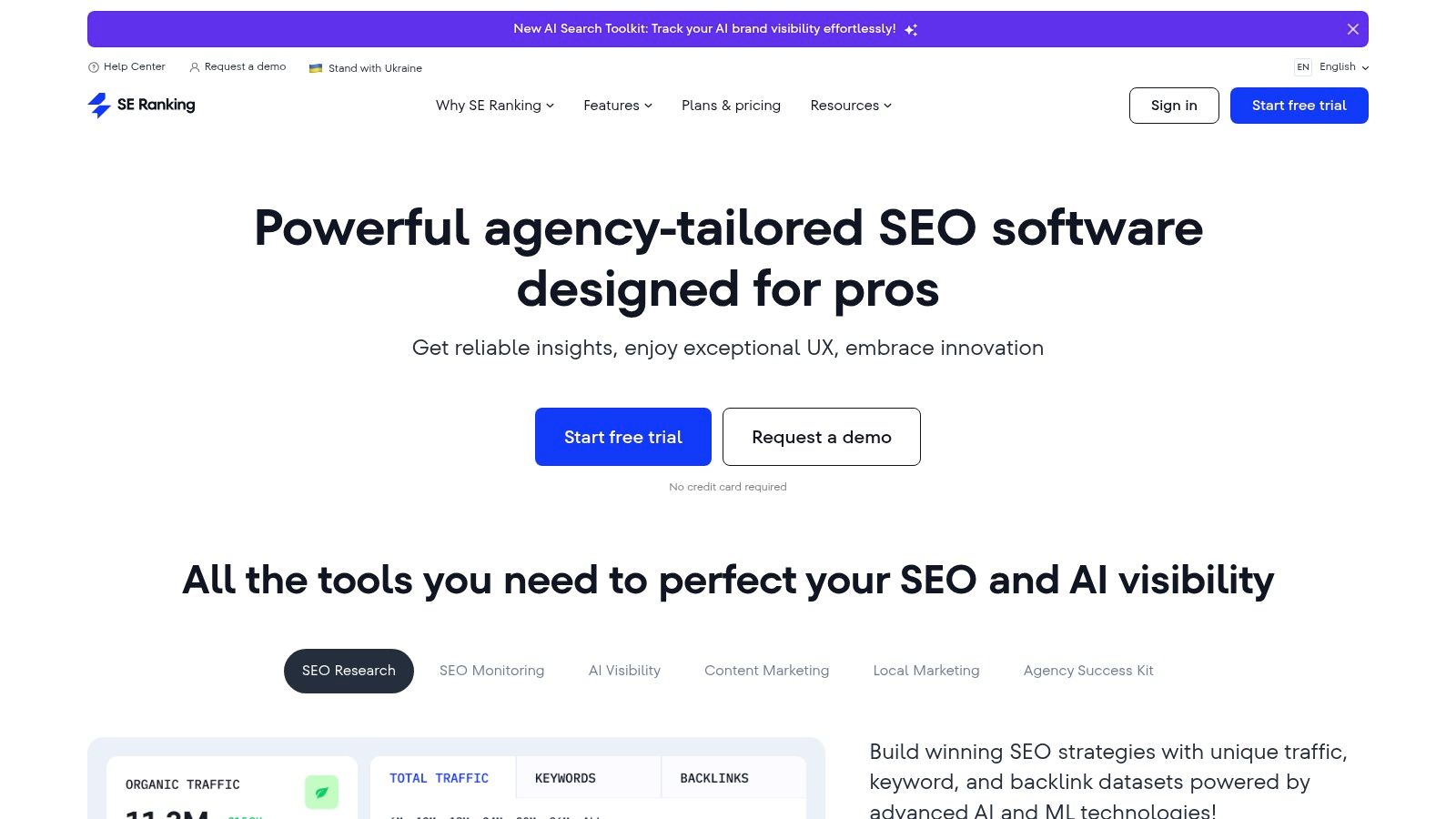
- Best for: Small to medium-sized businesses and agencies looking for an affordable, all-in-one SEO solution.
- Key Automation Feature: Scheduled white-label reporting and daily keyword position updates.
- Pricing: Starts from approximately £47/month for the Essential plan.
- Website: https://seranking.com/
4. Moz Pro
Moz Pro is renowned in the SEO world for its user-friendly interface and exceptional educational resources, making it a fantastic entry point into SEO automation. Its strength lies in simplifying complex data into actionable insights. For instance, I frequently use its Campaign dashboard to automatically track keyword performance and site crawl issues over time. This provides a clear, high-level overview without needing to dive into multiple, separate reports, making it a valuable piece of seo automation software for time-strapped teams.
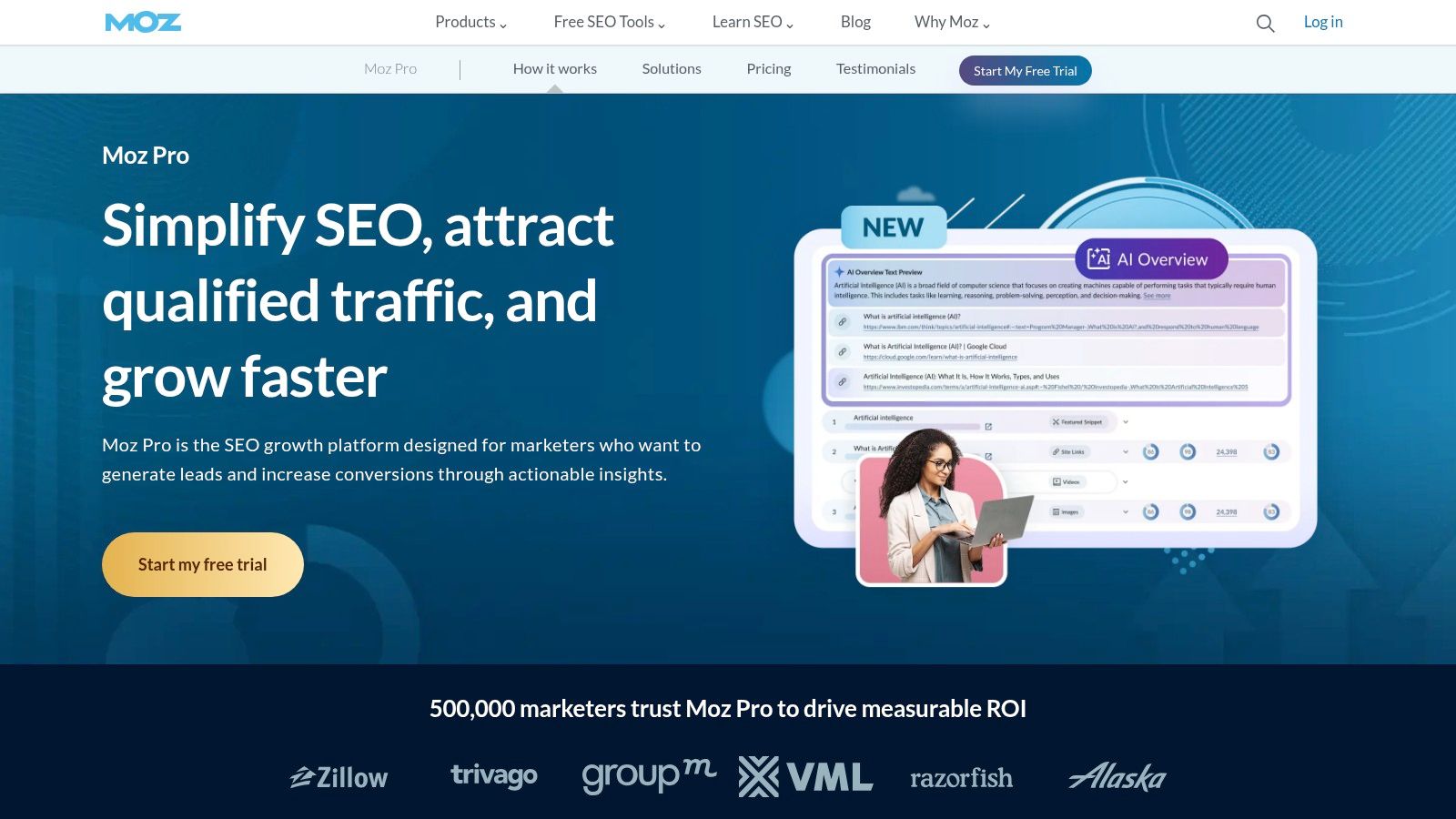
The platform excels at automating the fundamentals. Its Site Crawl feature can be scheduled to run weekly, automatically identifying technical SEO problems like broken redirects or missing title tags and tracking them over time. What truly sets Moz Pro apart is its powerful Link Explorer tool and proprietary metrics like Domain Authority (DA), a concept they pioneered. I can set up automated tracking for my backlink profile, receiving alerts on new links gained or lost, which saves a significant amount of manual checking and helps me react quickly to changes.
- Best for: Small to medium-sized businesses and marketers who value a user-friendly interface and strong educational support.
- Key Automation Feature: Scheduled site crawls and customisable, automated reporting on campaigns and link profiles.
- Pricing: Starts from approximately £78/month for the Standard plan.
- Website: https://moz.com/products/pro
5. Yoast SEO
For WordPress users, Yoast SEO is often the first introduction to search engine optimisation, and for good reason. It streamlines on-page SEO by automating many foundational technical tasks directly within the WordPress editor. While not a fully-fledged external platform, I find its real power lies in its automated content analysis. As I write a new blog post, Yoast provides real-time feedback on keyword usage, meta description length, and readability, guiding my content towards better optimisation without me needing to leave the page. This on-the-fly analysis is a simple yet effective form of SEO automation software for content creators.
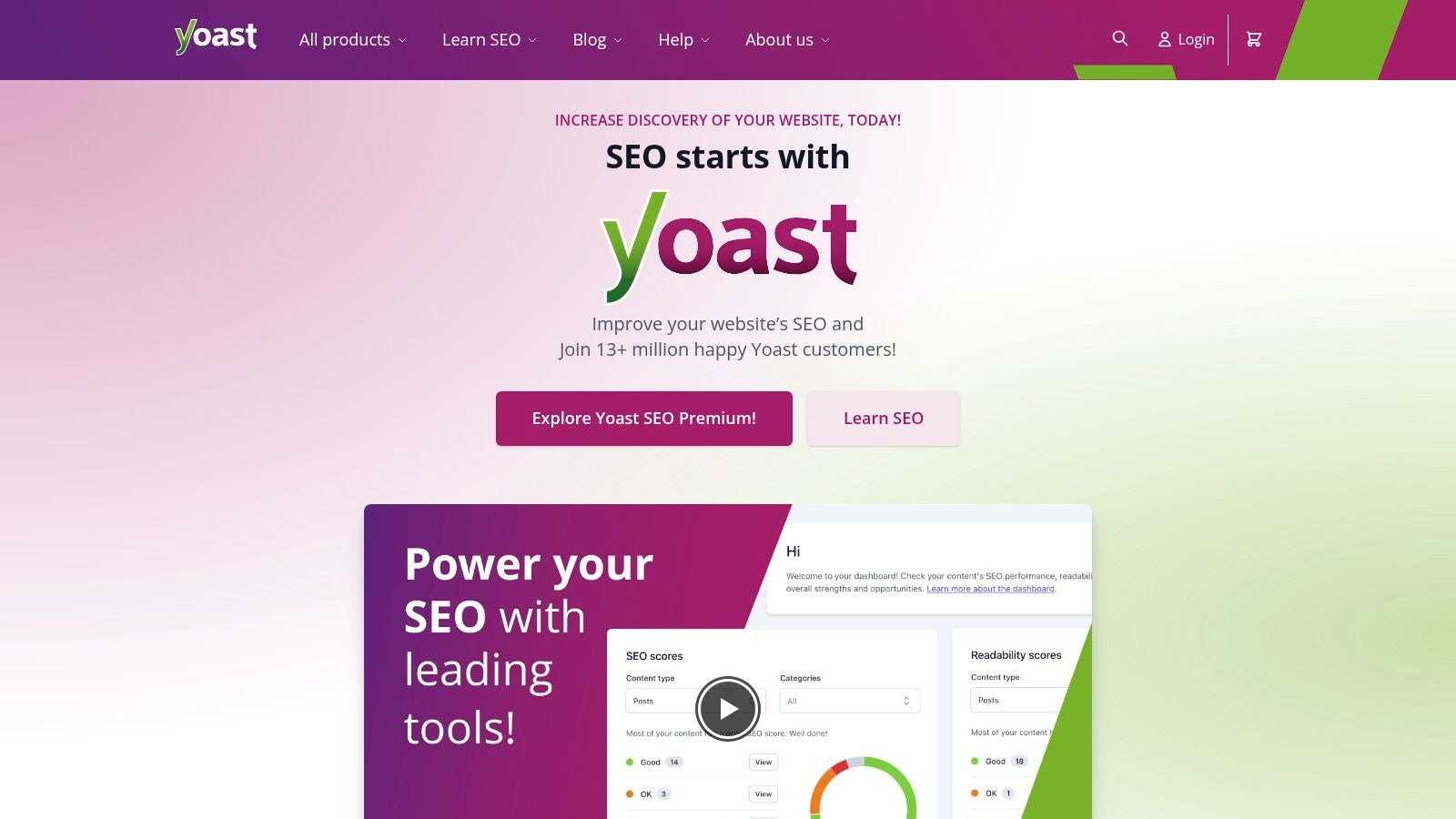
The plugin goes further by automatically generating and managing your XML sitemaps, which is crucial for helping search engines discover and index your content efficiently. It also handles the automated output of structured data (Schema markup) for your pages, which can help you earn rich snippets in search results. The official schema.org documentation highlights how important this is for search engines. While its free version is fantastic for beginners, the Premium version unlocks more advanced automation, like internal linking suggestions and redirect management, preventing broken links when you change a URL. It’s the perfect tool for automating the core on-page elements of SEO directly where the content lives.
- Best for: WordPress site owners and content creators needing real-time, on-page SEO guidance.
- Key Automation Feature: Real-time content analysis and automated XML sitemap generation.
- Pricing: A robust free version is available; Premium starts from £99/year (ex. VAT) for one site.
- Website: https://yoast.com/
6. Screaming Frog SEO Spider
Screaming Frog’s SEO Spider is less of a cloud platform and more of a powerful desktop-based crawler that acts as a technical SEO's best friend. I use it to automate the deep, technical auditing of a website, something that would be incredibly time-consuming to do manually. Its core automation feature is the ability to schedule crawls to run at specific times, for example, running a full site crawl every Monday morning to identify new technical issues before they impact performance. This makes it an indispensable piece of SEO automation software for technical audits.
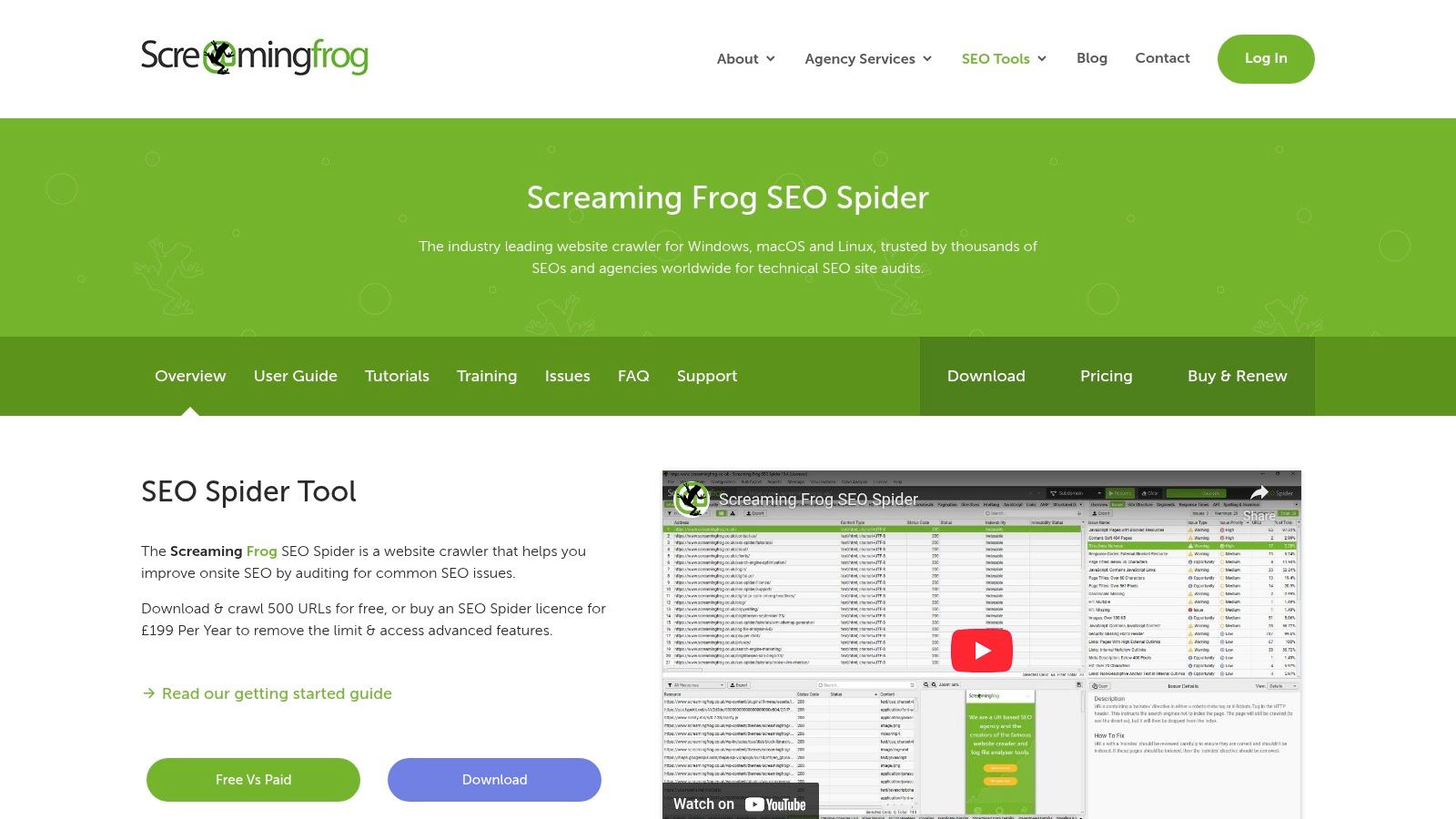
The real power lies in its detailed analysis and customisation. You can configure it to extract specific elements from a page using XPath, check for broken links, analyse page titles and metadata, or even integrate with Google Analytics and Search Console APIs to pull performance data directly into your crawl reports. For a large e-commerce site, I once used it to automatically extract product prices from thousands of pages to find pricing inconsistencies, a task that would have taken days by hand. While the interface can seem complex for newcomers, its speed and the sheer depth of data it provides for technical SEO are unmatched. It automatically organises everything, allowing you to quickly spot issues like duplicate content or incorrect redirect chains.
- Best for: SEO professionals and agencies needing deep, customisable technical site audits.
- Key Automation Feature: Scheduled, recurring site crawls and data extraction.
- Pricing: A free version is available for up to 500 URLs. The paid licence is £199/year.
- Website: https://www.screamingfrog.co.uk/seo-spider/
7. BrightLocal
For businesses heavily reliant on their local community, BrightLocal is an indispensable tool. It carves out a specific niche by focusing almost exclusively on local search factors, automating the monitoring and management tasks that are crucial for high visibility in map packs and localised results. I use its Citation Tracker to automatically scan the web for mentions of my clients' businesses, flagging inconsistencies in their name, address, and phone number (NAP) data. As confirmed by numerous local SEO studies, like Whitespark's annual survey, NAP consistency is a top local ranking factor.
The platform’s strength is its focused, actionable reporting. You can schedule a Google Business Profile audit to run weekly, which automatically generates a report highlighting optimisation opportunities, from missing service categories to photo upload frequency. While it isn’t an all-in-one SEO suite like some others on this list, BrightLocal excels as a dedicated piece of SEO automation software for any company wanting to dominate its local market, making it a powerful supplement to a broader SEO toolset.
- Best for: Local businesses, agencies, and multi-location brands focused on local search performance.
- Key Automation Feature: Automated local citation tracking and scheduled Google Business Profile audits.
- Pricing: Starts from approximately £24/month for the Single Business plan.
- Website: https://www.brightlocal.com/
8. KWFinder by Mangools
KWFinder, part of the Mangools suite, streamlines one of the most time-consuming parts of SEO: keyword research. While not a full automation platform, its strength is automating the discovery of high-opportunity, low-competition keywords. I find its genius lies in simplifying complex data. Instead of spending hours sifting through spreadsheets, KWFinder automatically calculates a precise keyword difficulty score and presents SERP analysis in a clean, intuitive interface, letting you find viable long-tail keywords in minutes.
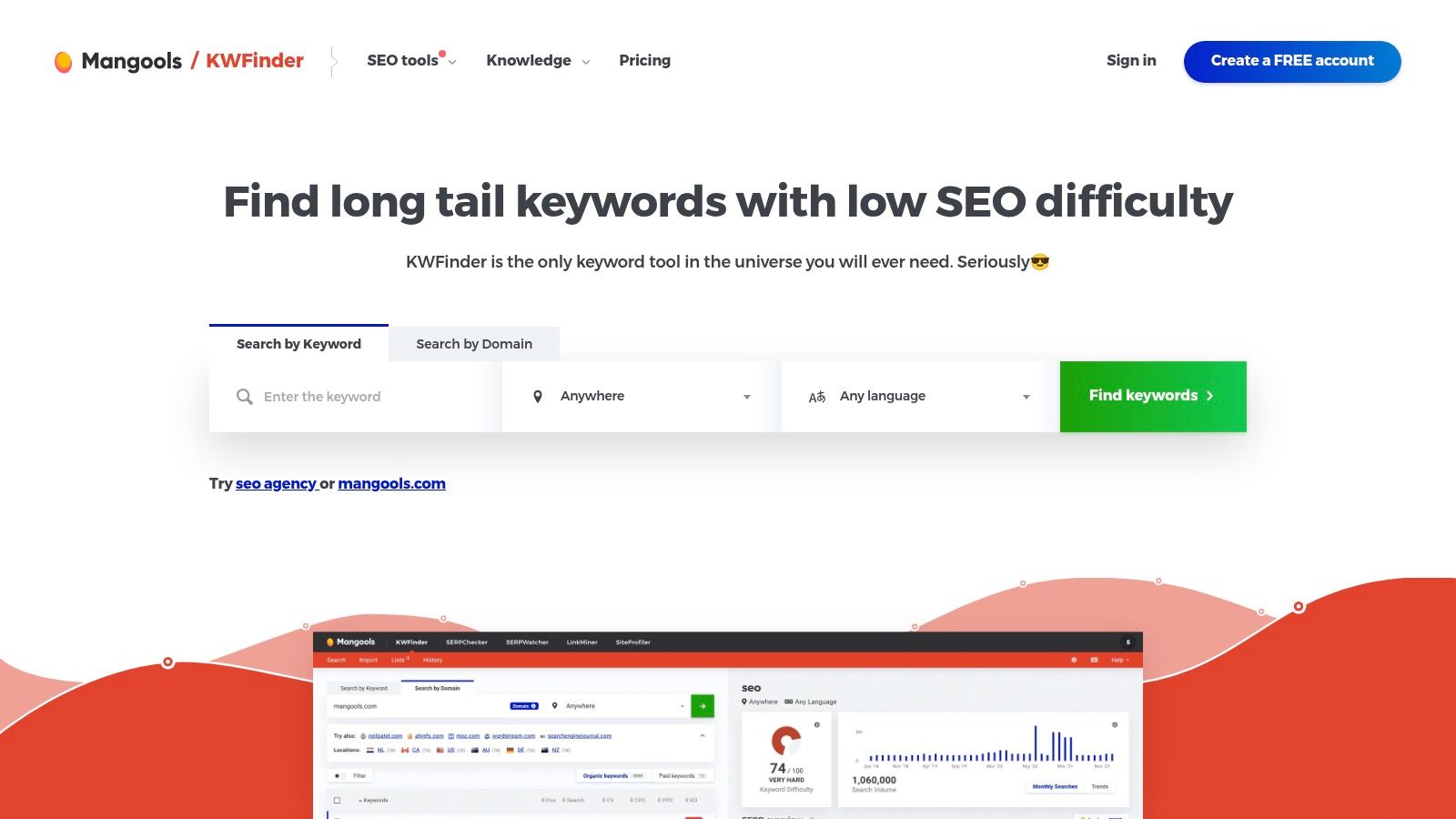
This tool is a prime example of targeted SEO automation software that excels at a specific task. By automating the competitor analysis and SERP data retrieval for any given keyword, it saves a significant amount of manual research time. For example, by plugging in a broad term like "garden furniture", I can instantly see a list of less competitive, long-tail questions like "what is the best all-weather garden furniture UK", complete with difficulty scores. The ability to quickly identify what your competitors are ranking for and find weaknesses in their strategy is invaluable. For anyone new to the complexities of this process, you can learn more about the fundamentals of keyword research to better leverage this tool. Its affordability and user-friendly design make it a standout choice.
- Best for: Freelancers and small businesses needing an affordable, highly effective tool for automating keyword discovery.
- Key Automation Feature: Automated keyword difficulty scoring and SERP analysis.
- Pricing: Starts from approximately £25/month for the Mangools Basic plan.
- Website: https://mangools.com/kwfinder/
9. Serpstat
Serpstat positions itself as a growth hacking tool, providing an all-in-one SEO platform that is notably more affordable than some of the larger players. Its automation capabilities are centred around monitoring and analysis, making it a strong contender in the SEO automation software space for those on a tighter budget. I find its keyword clustering tool particularly useful; it automatically groups related keywords based on SERP similarity, which saves a significant amount of manual effort when planning content hubs.
The platform's scheduled reporting is also a key automation feature. Similar to more expensive tools, you can set up automated site audits and rank tracking reports to be sent directly to your inbox. For a client in the competitive finance niche, I used the clustering tool to turn a list of 1,000 disjointed keywords into 50 distinct content topics, automating the entire content architecture planning phase. While its backlink database isn't as vast as Ahrefs or Semrush, the data is more than sufficient for small to medium-sized businesses looking to track their performance and identify technical SEO issues without a huge investment.
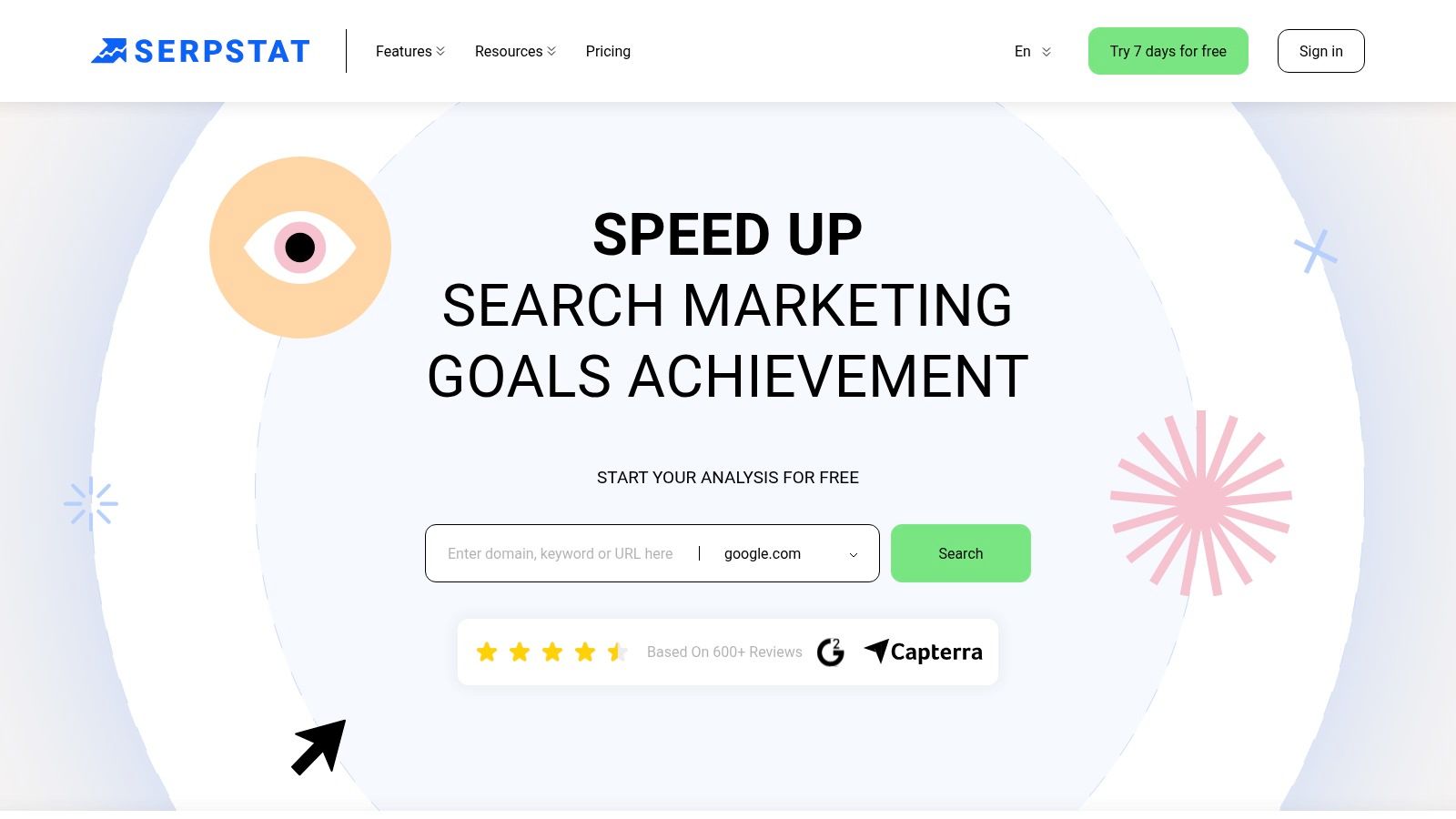
- Best for: Startups, freelancers, and SMBs needing a cost-effective, all-in-one SEO automation solution.
- Key Automation Feature: Automated keyword clustering and scheduled site audit reports.
- Pricing: Starts from approximately £45/month for the Lite plan.
- Website: https://serpstat.com/
10. SISTRIX
SISTRIX is a highly respected SEO tool suite, particularly well-known in Europe for its proprietary "Visibility Index." This metric provides a single, powerful score to gauge a website's overall search engine performance, which I find invaluable for high-level competitor benchmarking. While it offers a full range of SEO tools, its strength in automation comes from tracking this index over time. You can set up alerts to be notified of significant visibility shifts for your own site or competitors, providing an automated early warning system for market changes.
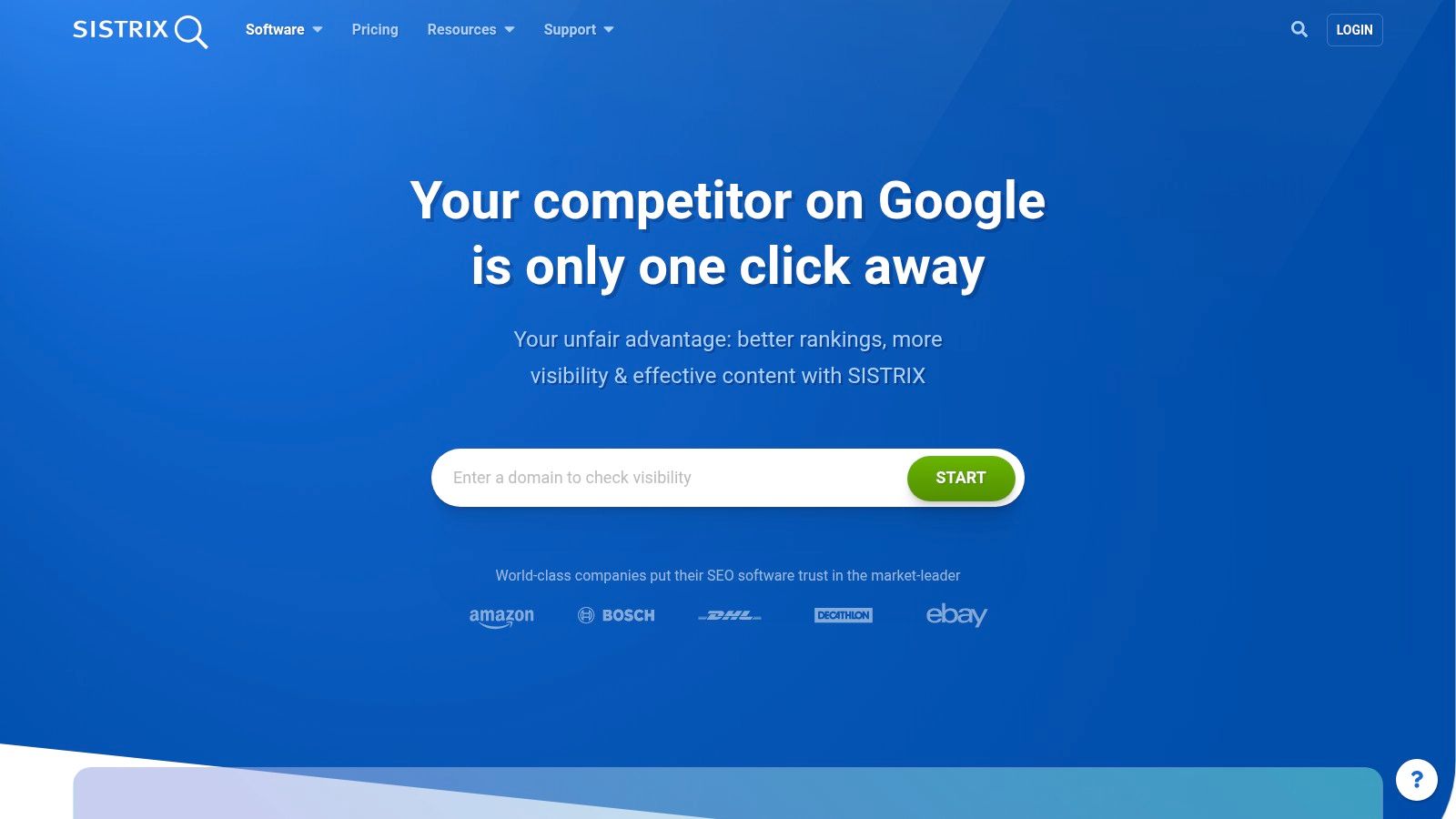
The platform automates the complex data aggregation needed to produce the Visibility Index, saving countless hours of manual analysis across thousands of keywords. I use it to automatically monitor how Google algorithm updates impact my key rivals, often spotting trends before they become obvious through rank tracking alone. For instance, I used its historical data to show a client how a previous competitor had been penalised by the September 2023 Helpful Content Update, which helped justify our own focus on content quality. This focus on a clear, long-term performance metric makes it a unique piece of SEO automation software, ideal for demonstrating SEO value to stakeholders who may not understand the finer details of individual keyword movements.
- Best for: SEO professionals and agencies focused on competitor analysis and long-term visibility tracking.
- Key Automation Feature: Automated tracking and alerts based on the historical Visibility Index.
- Pricing: Starts from €99/month for the "Start" package.
- Website: https://www.sistrix.com/
11. Alli AI
Alli AI takes a unique approach to on-page optimisation by automating the implementation process itself. Instead of just providing recommendations, it directly makes real-time changes to your site's code through a simple code snippet installation. For my clients who lack development resources, this is a game-changer. I can use its system to automate the generation and application of schema markup, meta titles, and alt text across hundreds of pages, saving an incredible amount of manual effort. This makes it a powerful piece of SEO automation software for scaling on-page efforts.
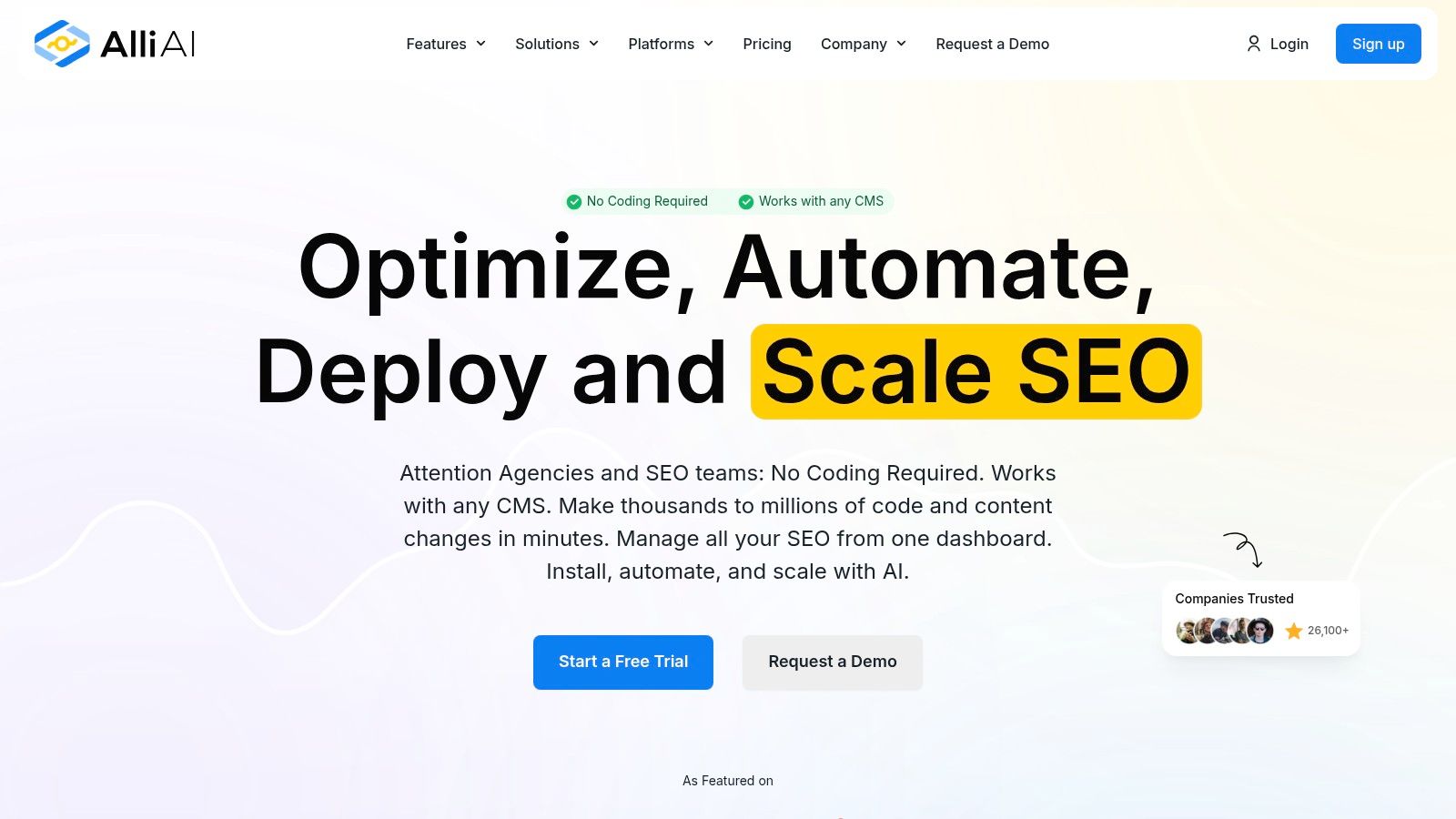
What truly sets Alli AI apart is its bulk optimisation capability combined with CMS integration. I can manage multiple client websites from a single dashboard, deploying optimised code and content without ever logging into their individual WordPress or Shopify backends. While this hands-off power is its main strength, it's also a point of caution; you must trust the AI's recommendations. The platform is definitely geared towards agencies or businesses managing a large portfolio of sites where manual, page-by-page optimisation is simply not feasible. You can find more details in this guide to AI SEO tools.
- Best for: Agencies and in-house teams managing multiple websites who need to automate on-page implementation.
- Key Automation Feature: Real-time, code-level on-page optimisations and bulk schema generation.
- Pricing: Custom pricing based on requirements; a demo is required.
- Website: https://www.alliai.com/
12. Pathfinder SEO
Pathfinder SEO offers a unique blend of software and service, making it stand out in the crowded SEO tool market. It’s designed for those who need more than just data; they need a clear, guided plan. The platform generates a personalised SEO roadmap with specific, actionable tasks, essentially automating the strategic planning process. For example, after an initial setup, it might automatically create a task list for the month that includes "Write a blog post targeting X keyword," "Optimise the Y service page," and "Find three backlink opportunities."
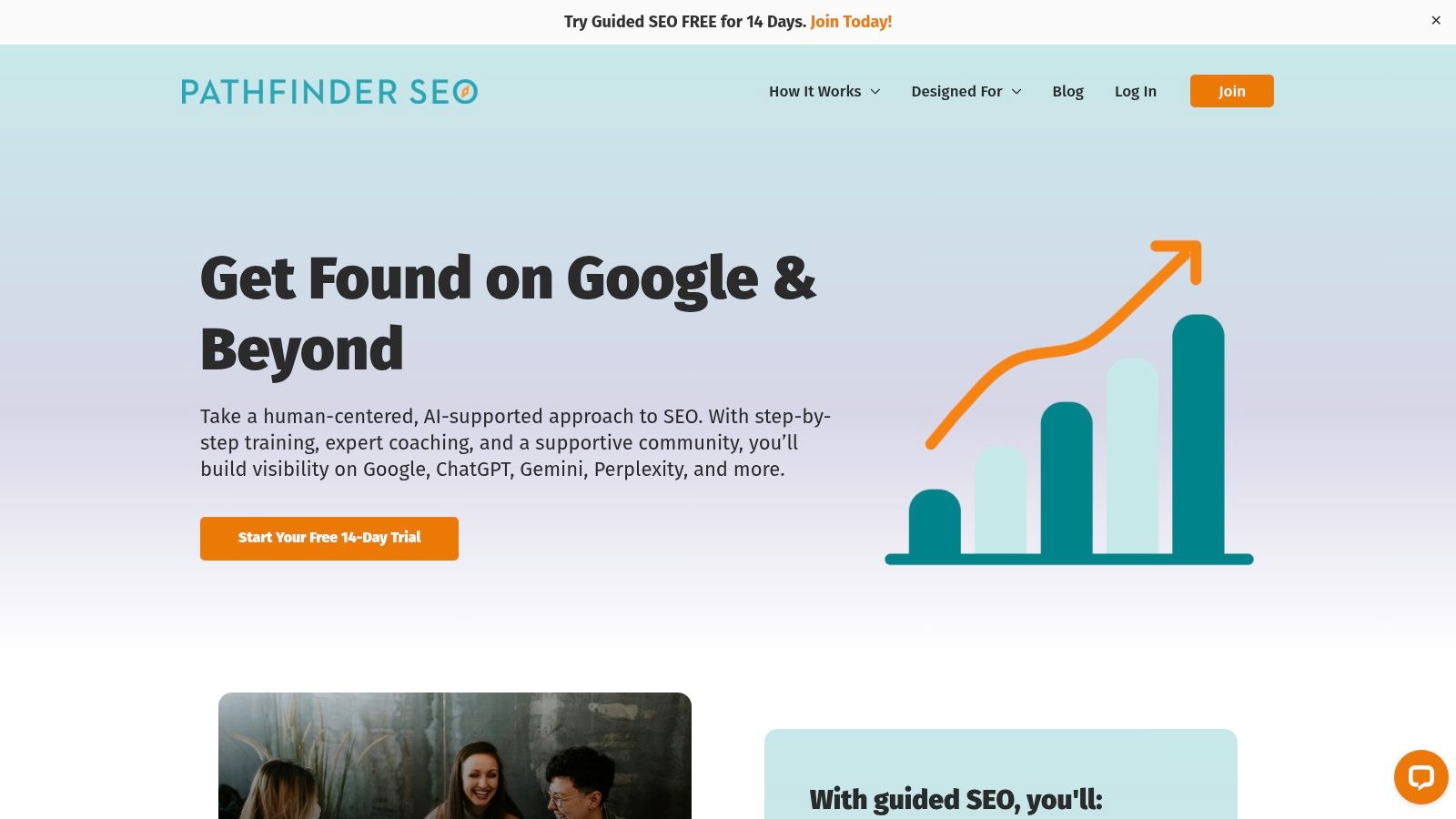
While it includes features like keyword research and rank tracking, its core value is the combination of these tools with dedicated coaching. The system automates monthly progress reports, showing you exactly how your efforts are translating into results against your customised roadmap. I see this as a form of SEO automation software that focuses on process and education rather than just raw data processing. It’s less about automating every technical check and more about automating a clear, step-by-step path to better rankings.
- Best for: SEO beginners, freelancers, and agencies needing a structured, guided process with coaching.
- Key Automation Feature: Generation of a personalised SEO roadmap and automated monthly progress reports.
- Pricing: Starts from approximately £41/month for the DIY plan.
- Website: https://pathfinderseo.com/
SEO Automation Software Comparison Summary
| Tool | Core Features | User Experience | Value Proposition | Target Audience | Price Point / Notes |
|---|---|---|---|---|---|
| Semrush | Keyword research, site audit, competitor analysis, integration | User-friendly, detailed reports | All-in-one SEO platform | SEO pros & marketers | Higher pricing, learning curve |
| Ahrefs | Backlink analysis, keyword tools, site audit, rank tracking | Accurate data, intuitive interface | Strong backlink and keyword data | SEO professionals | No free trial, pricey for SMBs |
| SE Ranking | Keyword rank tracking, audit, backlinks, reports | Easy to use, affordable | Cost-effective for all sizes | Small to large businesses | Affordable, smaller database |
| Moz Pro | Keyword research, link building, site crawl, rank tracking | Friendly UI, strong community | Good educational resources | Beginners to intermediates | Higher cost, some tool limits |
| Yoast SEO | Content analysis, readability, meta tags, sitemaps | Very easy, WordPress integration | Best for on-page content SEO | WordPress site owners | Free & premium; premium costly |
| Screaming Frog SEO Spider | Technical SEO audit, broken links, metadata, sitemap | Powerful but complex | Deep technical SEO insights | SEO specialists & agencies | Desktop only, complex UI |
| BrightLocal | Local rank tracking, citations, reviews, GMB audit | User-friendly, local focused | Local SEO & reputation management | Local businesses | Local SEO only, extra costs |
| KWFinder (Mangools) | Keyword difficulty, SERP & competitor analysis | Simple, accurate scores | Affordable keyword research | Bloggers, SMBs | Affordable, limited features |
| Serpstat | Keyword research, clustering, competitor & backlink analysis | User-friendly, comprehensive | Budget-friendly all-in-one tool | SMBs & marketers | Affordable, less frequent updates |
| SISTRIX | Visibility index, keyword & backlink analysis, on-page SEO | Clear interface, frequent updates | Strong visibility analysis | Mid to large SEO teams | Expensive, modular features |
| Alli AI | Automated on-page SEO, CMS integration, bulk editing | Easy integration, time-saving | Automation for agencies | Agencies & multi-site managers | Higher price, setup needed |
| Pathfinder SEO | SEO coaching, roadmap, keyword tools, progress reports | Guided, structured approach | Combines tools & expert advice | Beginners needing direction | Premium pricing, limited scope |
Choosing the Right Automation Tool for Your SEO Goals
Navigating the expansive landscape of SEO automation software can feel overwhelming, but as I have demonstrated throughout this guide, the key is not to find a single, universally "best" platform. Instead, your focus should be on identifying the tool that aligns perfectly with your unique business context, strategic objectives, and available resources.
The journey through platforms like Semrush and Ahrefs reveals the immense power of all-in-one suites, capable of handling everything from intricate keyword research to comprehensive competitor analysis. Yet, for many businesses, a specialised tool offers a more targeted and cost-effective solution. If your primary battleground is the local map pack, a dedicated platform like BrightLocal is non-negotiable. Similarly, for those who need to perform deep, granular technical audits, the capabilities of the Screaming Frog SEO Spider are simply unparalleled in their depth and precision.
From Insights to Implementation
Selecting the right SEO automation software is only the first step; successful implementation is where the real value is unlocked. Here are some critical factors to consider as you move from decision to action:
- Define Your Primary Use Case: Start by pinpointing your biggest SEO bottleneck. Is it content ideation and optimisation? Then a tool like KWFinder or even the content-focused features within SE Ranking might be your ideal starting point. Is it tracking hundreds of keywords across multiple projects? A robust rank tracker is essential.
- Embrace the Trial Period: I cannot stress this enough: make full use of the free trials. This is your opportunity to go beyond the marketing copy and experience the user interface, data accuracy, and workflow firsthand. Connect your Google Analytics and Search Console accounts to see how the platform interprets your actual site data.
- Consider Your Team's Expertise: A tool like SISTRIX offers profound, enterprise-level data, but it requires a certain level of SEO maturity to interpret and action its insights effectively. Conversely, platforms like Pathfinder SEO or Alli AI are designed to simplify complex processes, making them more accessible for solo entrepreneurs or smaller teams without a dedicated SEO specialist.
The True Purpose of SEO Automation
Ultimately, the goal of integrating SEO automation software into your workflow is not to "set it and forget it". True automation is about delegating the repetitive, data-heavy tasks to a machine so you can free up your most valuable resource: your strategic, creative, and analytical thinking. It's about letting the software handle the 'what' (what are my rankings, what are my backlinks) so I can focus on the 'why' (why did my rankings drop, why is this competitor outperforming me) and the 'how' (how can I create better content, how can I earn more authoritative links).
By choosing a tool that complements your skills and directly addresses your primary challenges, you transform it from a mere data provider into a powerful strategic partner. This partnership empowers you to make smarter decisions faster, scale your efforts efficiently, and, most importantly, drive tangible, measurable growth for your business.
Feeling ready to act on these insights but need expert guidance to build a cohesive strategy? At Mersudin Forbes Digital, I specialise in transforming the data from these powerful tools into actionable, revenue-driving SEO campaigns. Let's work together to choose the right software and build a strategy that delivers results.


